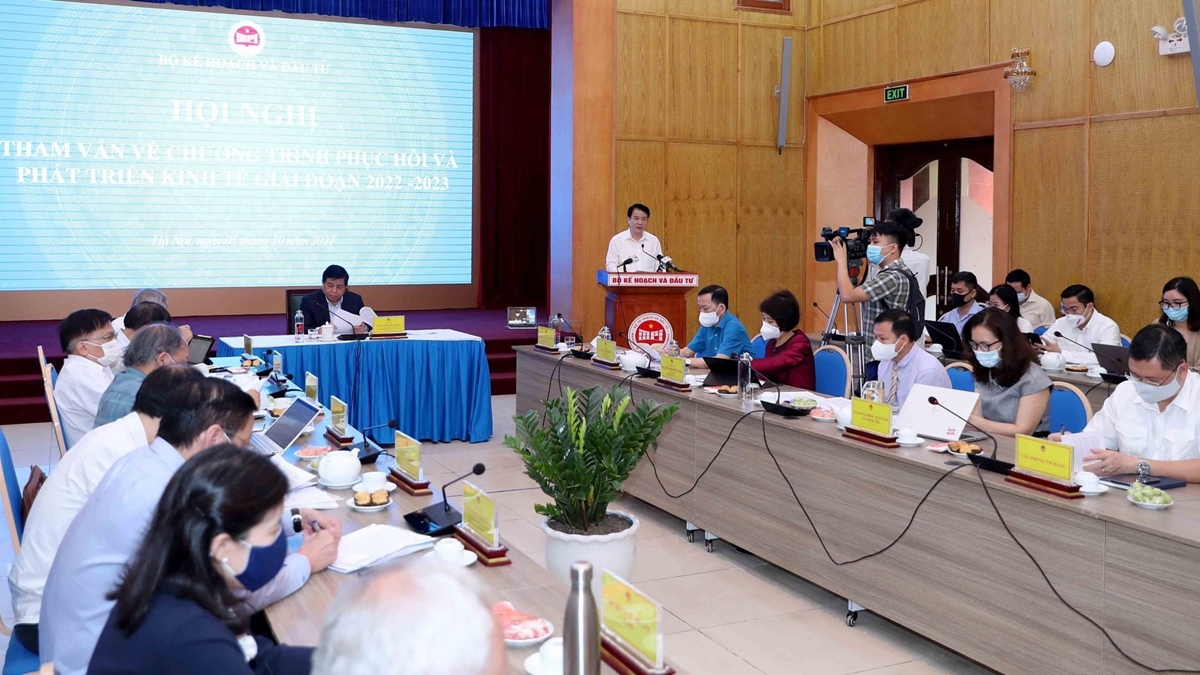MPI proposes solutions to support economic recovery and development
VOV.VN - There will be eight groups of tasks and solutions to support economic recovery and development, with a particular focus on maintaining macroeconomic stability, controlling inflation, supporting businesses, and stimulating consumption demand.

During a consultation conference on the economic recovery and development programme for the 2022 to 2023 period, Deputy Minister of Planning and Investment Tran Quoc Phuong said that since 2020, major partners of Vietnam and other countries in the region have provided large-scale support packages to help achieve a relatively high growth rate for the 2021 to 2023 period.
Countries largely focus on implementing fiscal policies aimed at prioritising infrastructure investment, reducing cost pressure for businesses, supporting local labourers, and boosting the development of the green economy, digital economy, and digital transformation.
Loose monetary policy primarily aims to reduce borrowing costs and increase access to loans of small and medium enterprises, along with business households.
Deputy Minister Phuong said that international organisations such as the Asian Development Bank (ADB), the World Bank (WB), the International Monetary Fund (IMF), and the UN Conference on Trade and Development (UNCTAD) has come up with many solutions to support economic recovery.
This is along with development in the ASEAN region, as well as in the nation, with policies that are properly implemented according to each stage of the pandemic, in line with the supervision ability of the State-run sector, and the characteristics of the economy.
Sustainable recovery therefore depends on ensuring financial stability and balancing risks between increasing public debt and private sector debt relating the size and duration of financial support policies, the Deputy Minister said, while underlining the necessity of implementing fiscal policies in a flexible manner. This should be done whilst supporting the health system, households, businesses, and economic recovery until the pandemic is fully brought under control on a global scale.
The economic recovery and development program for the 2022 to 2023 period aims to create a foundation to boost economic growth in this timeframe whilst the the COVID-19 pandemic is gradually brought under control. This will serve to ensure macroeconomic stability, control inflation, be consistent with long-term goals, orientations, and visions toward achieving the target of average annual economic growth of 6.5% and 7%/ in the 2021 to 2025 period.
As a means of meeting this target, Deputy Minister Phuong highlighted eight groups of tasks and solutions for economic support. Firstly, it is essential to contain the COVID-19 pandemic and improve the capacity of the local health system, especially grassroots and preventive medicine.
Secondly is to maintain macroeconomic stability to ensure large balances and control inflation.
Thirdly it can be considered imperative to improve institutions, administrative reform, administrative procedures, and the local investment and business environment.
In addition, it is crucial to restore and develop the local tourism industry whilst stimulating domestic consumption demand.
Furthermore, business recovery must be supported in a number of prioritised industries and fields with credit support solutions. Moreover, the restoration and mobilisation of resources for development investment is important, along with promoting foreign investment attraction and removing difficulties and obstacles for FDI enterprises.
This is along with developing regions and urban areas, whilst removing institutions to develop large cities nationwide.
Finally, a key task is to develop the labour market and labour force, improve the quality of human resources to meet the requirements of Industry 4.0, whilst simultaneously strengthening the connection between labour supply and demand, and supporting a sustainable career transition for workers.
The Ministry of Planning and Investment is responsible for monitoring the implementation of solutions and reporting the results to the Government at regular meetings in held June and December of both 2022 and 2023.

